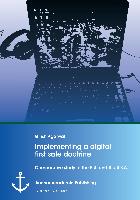Implementing a digital first sale doctrine: Comparative study of the E.U. and the U.S.A
BücherAngebote / Angebote:
Consumption of copyright materials such as, books, music, games, has changed dramatically in the internet age. We no more consume them as tangible goods. Instead we consume them as digital goods, which have characteristics different from tangible goods. The first sale doctrine in copyright law has been applied to tangible copyright goods since it was codified in the United States of America's Copyright Act of 1909. But due to the difference in the method of consumption of copyright goods, it is hard to apply the doctrine to digital ones. The question whether it should be applied to digital goods gained prominence when Redigi, a second hand market place for digital copyright goods, was sued by Capitol Records Inc. for infringing its copyright. Is it appropriate to abrogate the doctrine when it comes to digital goods or whether the doctrine should be applied irrespective of the method of consumption, takes centre stage. There are divergent views to this debate. In the European Union, after the UsedSoft case, the view is generally more favourable towards the application of the doctrine to digital goods, whereas, in the United States of America the view is more restrictive. But what copyright needs is a harmony between the divergent views, more favourably towards the views of the European Union, since, there have been technological advancements that do replicate the transfer of tangible goods in the digital domain. The doctrine of first sale is necessary in copyright law, irrespective of the method of consumption, as it tends to achieve a dual purpose. The first is public benefit. This it achieves by allowing more people to have access to literature and art. The second is economic benefit. It increases the overall economic activity by creating a market for second hand goods. But what should be kept in mind is that digital goods do have characteristics that make them easy to copy and distribute, which increases piracy. But should the answer to the problem lie in abrogating the doctrine for digital goods or in technology itself, there will be a problem. This is because once the doctrine has been abrogated, it will be almost impossible to reintroduce it, if and when technology should change and there rises a need for the doctrine. But if you let the doctrine be as it is and let technology accommodate the doctrine then it is much safer.
Folgt in ca. 10 Arbeitstagen




